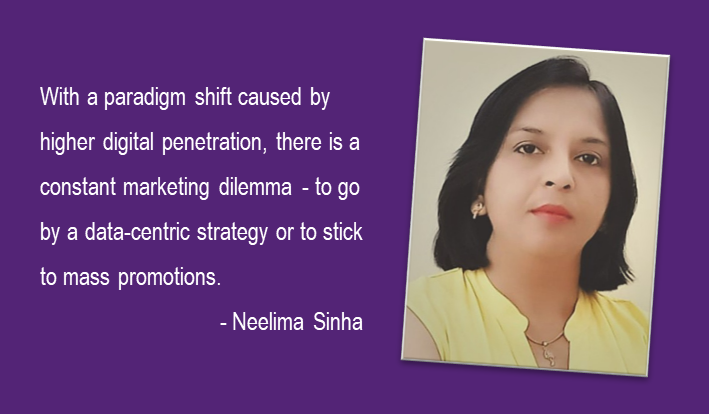The past year has brought in a gamut of changes, be it operations, market trends, supply patterns, or customer behavior. It is estimated that one in five customers switched brands between March and August 2020 and around 7 in 10 have shifted to new digital shopping channels. Not only has the new normal changed the business world, but also transformed the way marketers approached their target audience.
With a paradigm shift caused by higher digital penetration, there is a constant marketing dilemma: to go by data-centric strategy or to stick to mass promotions. In this transitional and increasingly complex economy, marketers are gearing to master their strategic plans while boosting overall growth. Keeping pace with the altering marketing models, marketers continue to navigate through the harsh winds of ever-evolving customer behaviors.
So, without further ado, let’s take a look at some major challenges that marketers face:
Understanding customer needs & creating personalised communication
Amidst the shift in buying patterns, marketers are rethinking how they can connect with their customers. As a result, most brands are shifting to precision marketing, where they focus on personalised marketing messages for a set of target consumers. Moreover, recent research states that around 70% of GenZ and 71% of millennials prefer personalised content. Moving in tandem with shifting trends, marketers plan to personalise offers and campaigns intending to target a narrower customer segment.
Creating an emotional and human connection through marketing messages requires well-defined consumer segments. For instance, a customer profile needs to be curated by determining their psychographics and behavioral traits that will further help in analysing their purchasing habits. Well, this requires data-centric insights and analytics. As existing data patterns seem invalid, keeping track of altering behavior and predicting forthcoming trends is becoming increasingly challenging.
Managing shifting priorities and marketing strategies
Due to the prolonged lockdown, more customers are confined to their homes. Out-of-home marketing strategies that had a massive impact earlier have now become obsolete. As a result, marketing teams across the globe are now giving more importance to digital marketing strategies.
More than 56% of brands are facing challenges in shifting their marketing priorities and strategies at a fast pace. Before the pandemic, a lot of brands had planned for trade shows, conferences, and other offline marketing activities but had to shift to virtual events rapidly. Additionally, in the constantly changing digital world, brewing value-added fresh content has become a raging challenge for the content marketing segment.
Maintaining a responsible & considerate brand image
Customers know what they want. They pay attention to how brands respond to their requirements during this time. Therefore, to protect brand image, taking appropriate action and adapting to customer needs are of utmost importance.
Moreover, customers have been cut off from their regular support systems like friend circles, and social groups, placing overwhelming pressure on customer care. This naturally gives room for call centers to buckle under the pressure. Hence, managing customer expectations digitally with empathy & mindfulness can help maintain the brand’s reputation during these tough times.
Here are a few ways businesses can explore to overcome such challenges:
Omnichannel touchpoints
Given the number of hours customers spend online, they are more likely to come across numerous marketing messages every day. Hence, businesses must deliver to-the-point marketing messages across various platforms if they want to stay ahead of the competition. Also, using digital touchpoints strategically is no longer an option for marketers in today’s world.
Leverage inbound traffic
As people nowadays are spending the majority of their time surfing the internet, there is a high chance for businesses to witness a rise in organic and paid traffic on their social media pages and websites. All of this inbound traffic spells opportunities that companies can use to their advantage.
Marketers can set up interactive strategies that engage inbound traffic and convert it into leads. Said marketers can use omnichannel marketing strategies and data from customer service to predict customer trends and behavior. In doing so, businesses will be able to increase their conversion rates.
Marketing automation
Minimised team size, optimised spending, and the need to lower customer acquisition costs, along with offering top-notch customer service, have made marketing automation critical in this changing business environment. Automation is making a way for companies to thrive on business challenges and boost their ROI on their marketing efforts.
All in all, creating newer, more flexible marketing models and tools is the way forward for those who wish to stay ahead in these uncertain times. Whether it’s understanding the trends or maintaining customer relationships, CMOs are faced with marketing challenges like never before. However, all is not lost, as technology can be your best friend in helping address the aforementioned challenges. Marketing technology also empowers companies to be more customer-centric, adaptable, and responsive to their customers.
Organisations can make smooth marketing transitions that are faster and cost-effective by leveraging technology. This definitely empowers organisations for success in an ever-changing virtual world.
The views and opinions published here belong to the author and do not necessarily reflect the views and opinions of the publisher.



Be the first to comment on "Working through the challenges faced by marketers"